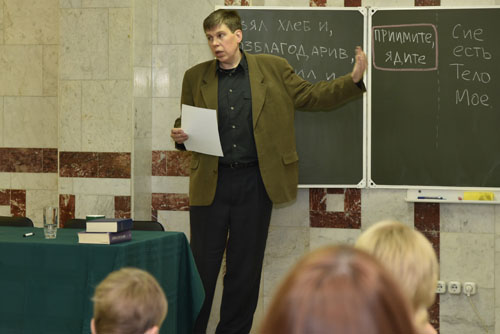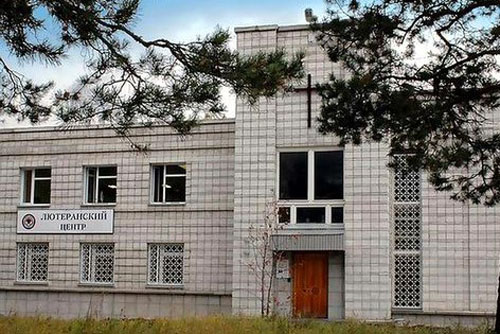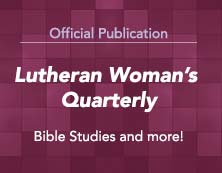2021–2023 LWML Mission Grant #7
Training Pastors to Serve the Church in Russia
Lutheran Theological Seminary, Novosibirsk, Siberia — $100,000
Watch the video about this mission grant!
About This Mission Grant
Through the efforts of the Siberian Evangelical Lutheran Church and the pastoral training provided by the Lutheran Theological Seminary in Novosibirsk, Siberia, the Word and Sacraments are again making their way to the long-repressed Russian people. With this grant, Lutheran Women’s Missionary League will partner in training pastors and deaconesses and in helping the seminary continue its efforts to restore the Lutheran Church in Russia. The Novosibirsk seminary’s goal is to prepare workers to spread the true Word of God to the Russian people. This grant will fund some of the operational expenses of the seminary and allow it to continue providing a solid theological education to those seeking to serve as pastors and deaconesses within the Siberian Lutheran Church.
Mission Grant Resources
featured February 2022
Bulletin Flyer (b/w half page insert, 2 per page)
Prayer Guide & Story (combined)
Large Print Resources for Grant #7

The laying on of hands is perhaps the defining moment in the ordination of a new pastor. In December 2018, Siberian Lutheran Bishop, Vsevolod Lytkin, ordained Deacon Vitaly Smirnov as a new priest at the Parish of Saint Andrew in Novosibirsk. (In Russia, pastors are often referred to as svyaschennike, which is translated into English as priests.) The Bishop called the occasion a "Christmas gift from God to the Lutherans in Siberia." Rev. Dr. Alexey Streltsov, rector of Lutheran Theological Seminary in Novosibirsk, (left in the photo above) called the newly ordained Fr. Vitaly a man of integrity and a very good and committed Lutheran student of theology, who got to know really well the treasures of the Gospel as they were presented in the Scripture and the Lutheran confessions."

Becoming a full-time seminarian often means personal sacrifices for many of the students studying for the pastoral ministry at the Novosibirsk seminary in Russia. Most are from other parts of country, or from surrounding countries, and it is often necessary to relocate to Novosibirsk, a city of some two million people in the southwestern part of Siberia. The seminary offers some courses remotely, but to get the most from their seminary education usually requires that seminarians attend classes in person, interacting with the seminary's faculty and fellow seminarians. Many students are married and have children, so relocating to Novosibirsk also means finding new employment for both them and their spouse to help sustain them through their time at the seminary.
Approved Resolution at the LWML Convention
WHEREAS, Christ in His Holy Word has charged us to prepare men for pastoral ministry and what you have heard from me in the presence of many witnesses entrust to faithful men, who will be able to teach others also (2 Timothy 2:2); and
WHEREAS, the Lutheran Theological Seminary in Novosibirsk, Siberia, trains pastors and deaconesses to serve in confessional Lutheran parishes throughout Russia, especially in Siberia, restoring the Lutheran Church in Russia, and most importantly, teaching God's true Word to a people long repressed by atheistic communism; and
WHEREAS, the private family foundation that has fully funded the seminary since its inception in 1997 has significantly reduced its contribution, creating a need for the seminary to seek partial funding from the LWML to cover annual operating expenses; and
WHEREAS, the Siberian Lutheran Mission Society continues its ongoing campaign to raise funds to permanently endow the seminary's future expenses by 2023; therefore, be it
RESOLVED, that the delegates of the 2021 Lutheran Women’s Missionary League Convention scheduled for Lexington, Kentucky, vote the sum of $100,000 to help fund Training Pastors to Serve the Church in Russia.
More Mission Grant Photos

The interaction between student and teacher is a critical part of the pastoral training program at the Lutheran Theological Seminary in Novosibirsk, Siberia. The seminary has a first-class faculty and as a confessional Lutheran seminary, standards are high. Some faculty members have received their theological education, in part, at Concordia Theological Seminary in Fort Wayne, Indiana, including the seminary rector himself, Rev. Dr. Alexey Streltsov. In describing the rigors of the education provided at the Novosibirsk seminary, Dr. Streltsov describes it as "neither lay discipleship training or short-term leadership preparation, but a serious effort that makes demands upon both teacher and student. After all, the Apostles themselves spent no fewer than three years in the 'seminary' of our Lord Jesus Christ."

Each year, the Novosibirsk seminary professors host seminars for adults throughout Russia and neighboring countries like Ukraine, Moldova, Kazakhstan, Kyrgyzstan, and Georgia. Many lay people, often in small groups like this one at the Parish of the Holy Trinity in Chita, Siberia, have attended these evangelism and catechetical seminars. This seminar was led by Rev. Dr. Pavel Khramov, a professor at the seminary as well as pastor at St. Andrew's parish in Novosibirsk. Holy Trinity parish is a small congregation, in which one-third of the parishioners are deaf. Known for their mission-mindedness, parishioners are always anxious to "talk-up" Jesus to their friends and neighbors. They are served by two ministers, one of them, Deacon Roman Kislov is the first deaf clergyman in the Russian church.

The priest is a salvation enabler; he is God's hands and mouth in this world. (In Russia, pastors are often referred to as svyaschennike, which is translated into English as priests.) Here at the Parish of St. Luke in Yurga, Siberia, in which many of the parishioners are ethnic Germans, Fr. Vitaly Smirnov, passes out small crosses to recently baptized young people. Each year, seminary students and professors fan out over the Russian landscape to conduct camps for youth, in the hope that they will find their way to the saving grace that comes with baptism. At one Sunday service in June 2020, Fr. Vitaly, a 2018 graduate of the seminary in Novosibirsk, baptized an entire family, a first for him and a celebration of great joy.

New life, a new Christian-in August 2020, Fr. Vitali Gavrilov, of the Parish of the Transfiguration in Tuim, Siberia, baptized his granddaughter. As he reflected on the occasion, Fr. Vitali said, "How fleeting is our earthly life, its values are ephemeral, its dreams are ghostly. But among all our worries and interweaving, there are moments that change us forever. … We live, passing from one stage to another. We are kids, we are teenagers, we are young men, we are adults, and we are parents. And our worries only increase, and not about ourselves and not about our well-being. And the time reminds us of old age, when we are called as 'grandparents.' … And this is a new part of my life. I seem to be the same, but I just have been changed, because I began to be called 'grandpa.'"

The Lutheran Theological Seminary in Novosibirsk, Siberia, is housed in a former bank building. The seminary grew out of "The "Russian Project" at Concordia Theological Seminary in Fort Wayne, Indiana. The seminary is located on the second floor of this building, and the Parish of St. Andrew is situated on the first floor. St. Andrew is the parish in which Bishop Vsevolod Lytkin of the Siberian Evangelical Lutheran Church serves. The Siberian Lutheran Church is in full altar and pulpit fellowship with The Lutheran Church—Missouri Synod. In the early days of the seminary, pastors from Missouri Synod churches travelled to Russia as visiting professors until an all-Russian faculty could be appointed. That happened in 2009. Today, the seminary is a strong independent institution, fully committed to confessional Lutheran doctrine and practice.










